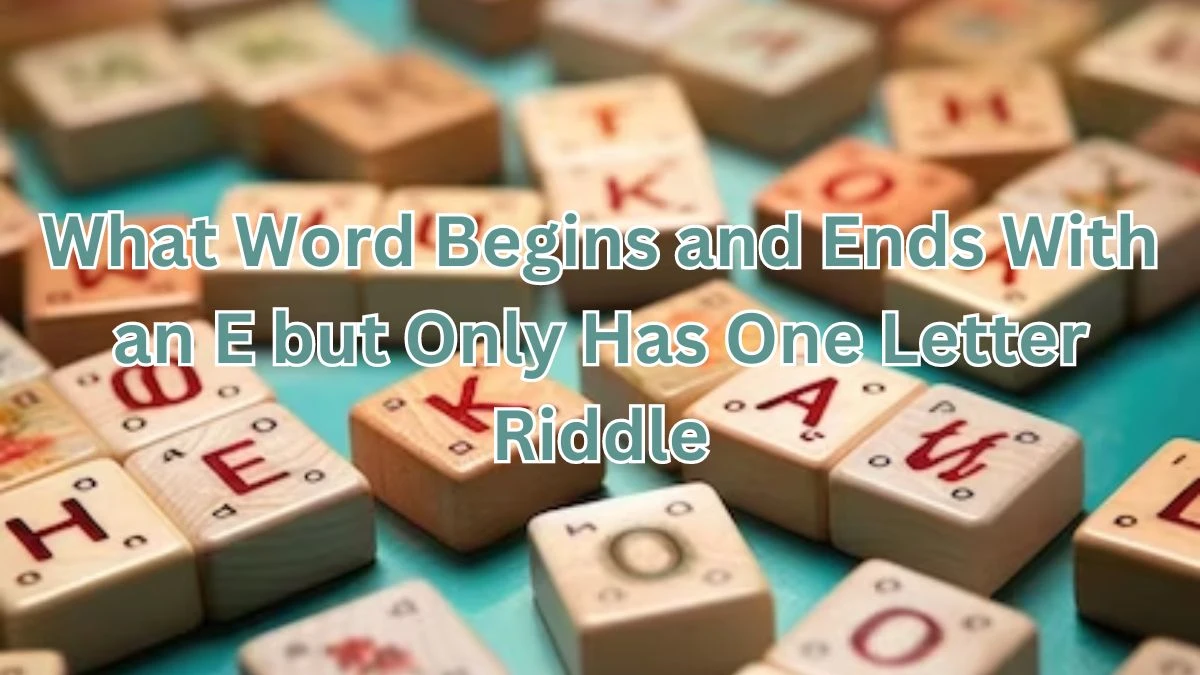- Rojgarlive »
- Riddle »
- What Word Begins and Ends With an E but Only Has One Letter Riddle and Answer
What Word Begins and Ends With an E but Only Has One Letter Riddle and Answer
by S Samayanka
Updated Feb 20, 2024

What Word Begins and Ends With an E but Only Has One Letter Riddle
The riddle "What word begins and ends with an E but only has one letter?" is a clever linguistic puzzle that prompts creative thinking. It plays with the idea of words' starting and ending letters, emphasizing the letter "E" in this case. The phrase "one letter" suggests that the word in question has only a single letter between the initial and final "E." This riddle showcases the versatility of language and how it can be manipulated for wordplay and humor.
It challenges listeners to engage in critical thinking and lateral reasoning, as the answer may not be immediately apparent and requires thinking outside conventional patterns. The riddle serves as an enjoyable and stimulating activity that fosters conversation and interaction among friends and family.
Riddle: What Word Begins and Ends With an E but Only Has One Letter?
What Word Begins and Ends With an E but Only Has One Letter Riddle Answer
The answer to the riddle "What word begins and ends with an E but only has one letter?" is the word "Envelope." At first glance, the riddle seems tricky because it asks for a word that starts and ends with "E," yet only has one letter in between. However, when we think about it, an envelope fits the criteria perfectly.
It begins with the letter "E," ends with the same letter, and typically contains a single sheet of paper inside, representing the "one letter" mentioned in the riddle. This explanation highlights how the riddle cleverly plays with language and challenges us to think creatively. It's a fun and engaging way to test our lateral thinking skills and enjoy a moment of wordplay.
Answer: Envelope
What is Riddle?
A riddle is a form of enigmatic expression that challenges the intellect and encourages creative thinking. It typically presents a puzzling question or problem, often in a metaphorical or allegorical manner, with the goal of teasing out a clever and unexpected answer.
Riddles have been an integral part of human cultures throughout history, serving as a source of entertainment, mental stimulation, and sometimes even educational tools. They exist in various forms, from verbal puzzles to written or visual conundrums. Riddles often require lateral thinking, as they demand individuals to approach problems from unconventional angles to arrive at a solution.
In essence, a riddle is a playful and imaginative exercise that invites individuals to engage their cognitive abilities, fostering a sense of curiosity and the joy of unraveling mysteries. Whether used for amusement, social interaction, or intellectual development, riddles endure as timeless expressions of human ingenuity and the universal desire for mental challenges.
Benefits of Solving Riddle
- Mental Exercise: Engaging with riddles provides a mental workout, enhancing cognitive abilities and boosting critical thinking and problem-solving skills.
- Language Development: Riddles, often filled with wordplay and clever language usage, contribute to the enrichment of vocabulary. Regular exposure improves linguistic creativity and proficiency.
- Cultivation of Creativity: The process of unraveling riddles encourages thinking outside conventional boundaries, fostering creativity and imaginative thinking.
- Entertainment and Social Interaction: Solving riddles is an enjoyable activity, offering entertainment and amusement. It can be a social experience, promoting interaction and friendly competition.
- Educational Insights: Riddles often convey cultural or historical insights, serving as a playful means to learn about language, traditions, and societal aspects. They can be incorporated into educational settings for engaging learning.
- Confidence Building: Successfully solving challenging riddles instills a sense of accomplishment, boosting self-confidence, and encouraging perseverance when faced with mental challenges.
- Memory Enhancement: Recalling information from riddles contributes to memory improvement. The mental effort involved in solving them strengthens memory retention.
- Logical Reasoning Development: Riddles typically follow a logical structure, guiding individuals through a sequence of thoughts or deductions. This aids in the development of logical reasoning skills.
What Word Begins and Ends With an E but Only Has One Letter Riddle - FAQs
A riddle is a puzzling question or problem that challenges the intellect and encourages creative thinking, often presented in a metaphorical or allegorical manner.
The answer is "Envelope."
Solving riddles provides mental exercise, language development, cultivation of creativity, entertainment, and social interaction, along with educational insights.
Riddles, filled with wordplay and clever language usage, enrich vocabulary and improve linguistic creativity and proficiency.
Solving riddles enhances critical thinking, problem-solving, creativity, memory, and logical reasoning skills.




